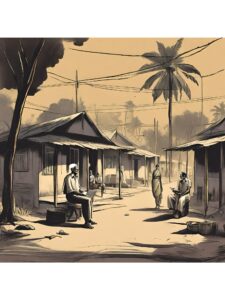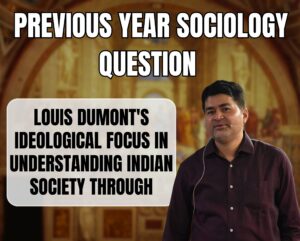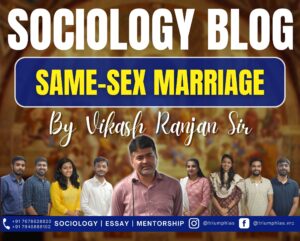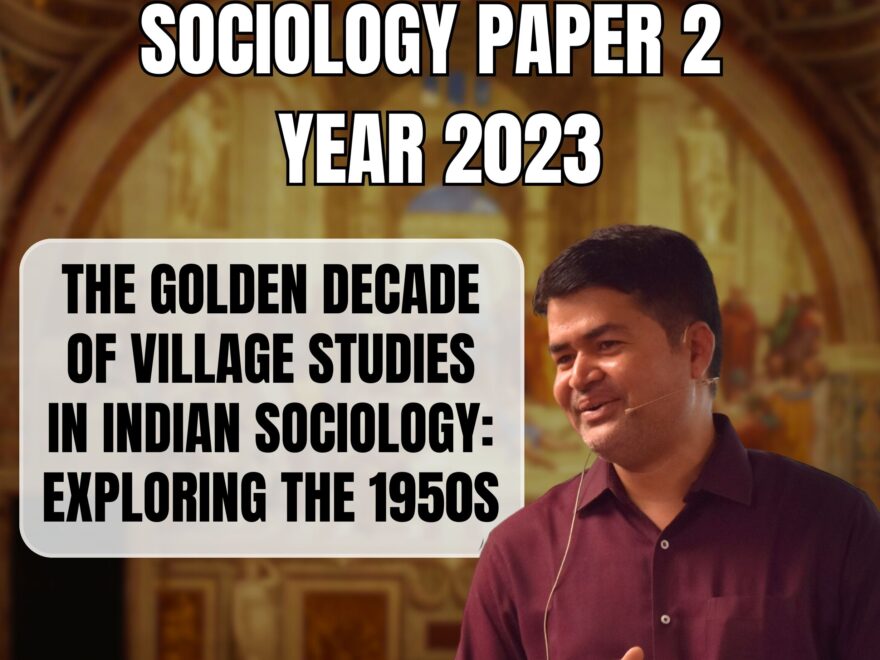

“The decade of the 1950s was the golden period of village studies in Indian Sociology. Explain the statement.”
Section: A
Sociology Paper 2023 Analysis
(Paper 2: Unit-12 Rural and Agrarian Social Structure)

Question: 1 (b) “The decade of the 1950s was the golden period of village studies in Indian Sociology. Explain the statement.”
(10 Marks)
| Introduction: Brief Context of Village Studies
Main Body: Highlighting it as Golden Period Citing the Reasons for the Focus on Village Studies, the Significance, Constraints of Village Studies in Brief Conclusion: Relevance of Village Study in Policy Formulation |


Introduction:
The study of villages in India holds a unique and significant place in the realm of sociology. Sociologists and social anthropologists carried-out a large number of studies focusing on the social and cultural life of the village in India. Most of these studies were published during the decades 1950s and 1960s. These “village studies” played an important role in giving respectability to the disciplines of sociology and society in India.
Main body:
Reasons for focus on village studies during the time period of 1950s and 1960s
- Colonial Perspective: The earliest studies of Indian villages were driven by colonial rulers and scholars, primarily for the purpose of land policies and control. During this period, villages were often perceived as isolated and unchanging units. For instance, scholars like Metcalfe described Indian villages as monolithic, atomistic, and unchanging entities, almost independent of foreign relations. This colonial perspective laid the groundwork for later village studies.
- Post-Independence Shift: With India gaining independence and undergoing industrialization in the 1950s, there was a paradigm shift in how villages were studied. The focus transitioned from control to transformation, as the stagnant agrarian economy needed revitalization.
- Agrarian Transformation: Village studies emerged as a means to understand and reform agrarian structures, which was a top priority in the context of development studies during this period.
- Conceptual Focus: Scholars turned their attention to comprehending the complexities of rural life, including aspects such as peasantry, folk culture, and traditional practices. These studies aimed to provide a deeper understanding of the dynamics at play in rural India.
Importance of Village Studies in India:
- Realistic Assessment: Post-independence, empirical field studies replaced earlier theoretical views. Researchers delved into the economic underpinnings, cropping patterns, and agrarian structures of villages, offering a more realistic understanding of rural life. André Béteille, for example, emphasized that villages were not just places where people lived; they had designs that reflected the basic values of Indian civilization.
- Social and Cultural Insight: Village studies provided holistic accounts of economic, social, and cultural conditions. Gender and caste emerged as critical factors shaping labor divisions within villages. These studies highlighted that villages were not only caste-conscious but also gender-conscious. According to S.C. Dube, gender was a pivotal determinant of labor division in villages, alongside caste.
- Development Planning: Village studies played a pivotal role in creating comprehensive profiles of rural India. These profiles, grounded in empirical data, proved invaluable for formulating accurate policies. Village studies authenticated traditional social orders while also tracing their transformation, a necessity in the post-independence era.
- Government Interest: The Indian government, committed to rural development, sought reliable data to guide its policies. Given the scepticism about post-colonial officials, academic surveys conducted through village studies provided the trustworthy information needed for policymaking.
- Community and Networks: Village studies explored the intricate web of close-knit communities and social networks within rural areas. They shed light on social interactions, cooperation mechanisms, and conflict resolution practices. Insights into social capital and collective action emerged from these studies. For instance, Oscar Lewis’s study of Rani Khera village highlighted how villages were part of larger networks based on kinship groups. M.N. Srinivas argued that villages offered a crucial sense of identity to their residents.
- Developmental Interventions: The data and insights generated through village studies directly influenced policies related to rural development, poverty reduction, and education, healthcare, and infrastructure program For example, Oscar Lewis worked with the Ford Foundation in India to develop an objective evaluation scheme for the rural reconstruction program.
- Interdisciplinary Approach: Village studies enriched the understanding of economic growth and development planning by bringing together sociological insights with the quantitative methods of economists. This interdisciplinary approach proved fruitful in comprehending the complexities of rural India.
- Historical Continuity: Villages, with their historical continuity and stability over centuries, offered a microcosmic view of India. They provided invaluable insights into on-going social processes and problems within Indian society.
- Important Administrative and Social Unit: Villages were not just subjects of study but also important administrative and social units. They were closely tied to the lives, livelihoods, cultures, and identities of their inhabitants. Villages significantly influenced behaviour patterns within their communities.
- Stability and Continuity: Villages’ stability and continuity over centuries made them ideal subjects for studying cultural patterns, behavior dynamics, and socioeconomic structures over extended periods.
Constraints of Village Studies:
- While participant observation was strength of village studies, it also had limitations. Researchers often limited their perspectives to gain acceptance within the community, resulting in conservative accounts of village life.
- Researchers sometimes approached villages through dominant sections of society, restricting their access to other perspectives. Avoidance of sensitive questions due to fear of offending dominant interests further limited the depth of data collection.
- Indian villages were internally differentiated with diverse worldviews. Researchers often aligned themselves with dominant caste groups, which limited their access to the perspectives of lower castes and raised suspicions among these groups.
- Dominant theoretical perspectives of the time tended to focus on social structure and stability rather than change and conflict. This bias influenced researchers to emphasize the reproduction of social order over the examination of social transformation within villages.
- S.C. Dube critiqued village studies for being unrepresentative, exaggerating the unity and self-sufficiency of villages, and imitating Western methods and concepts.
Conclusion:
Hence the decade of the 1950s indeed marked a golden period for village studies in Indian sociology. These studies provided a comprehensive understanding of rural life, social structures, cultural practices, and economic patterns. Despite their limitations, village studies offered valuable insights for policymakers, researchers, and sociologists working towards inclusive development, social justice, and the overall well-being of rural communities in India.
Related Blogs…
 |
 |

To master these intricacies and fare well in the Sociology Optional Syllabus, aspiring sociologists might benefit from guidance by the Best Sociology Optional Teacher and participation in the Best Sociology Optional Coaching. These avenues provide comprehensive assistance, ensuring a solid understanding of sociology’s diverse methodologies and techniques.
META TAGS:
Village studies, Village studies sociology, Village studies in India, Indian sociology, S.C. Dube, 1950s, patriarchy, rural life, development planning, social capital, interdisciplinary approach, social justice, policy formulation, André Béteille
Why Vikash Ranjan’s Classes for Sociology?
Proper guidance and assistance are required to learn the skill of interlinking current happenings with the conventional topics. VIKASH RANJAN SIR at TRIUMPH IAS guides students according to the Recent Trends of UPSC, making him the Best Sociology Teacher for Sociology Optional UPSC.
At Triumph IAS, the Best Sociology Optional Coaching platform, we not only provide the best study material and applied classes for Sociology for IAS but also conduct regular assignments and class tests to assess candidates’ writing skills and understanding of the subject.
Choose The Best Sociology Optional Teacher for IAS Preparation?
At the beginning of the journey for Civil Services Examination preparation, many students face a pivotal decision – selecting their optional subject. Questions such as “which optional subject is the best?” and “which optional subject is the most scoring?” frequently come to mind. Choosing the right optional subject, like choosing the best sociology optional teacher, is a subjective yet vital step that requires a thoughtful decision based on facts. A misstep in this crucial decision can indeed prove disastrous.
Ever since the exam pattern was revamped in 2013, the UPSC has eliminated the need for a second optional subject. Now, candidates have to choose only one optional subject for the UPSC Mains, which has two papers of 250 marks each. One of the compelling choices for many has been the sociology optional. However, it’s strongly advised to decide on your optional subject for mains well ahead of time to get sufficient time to complete the syllabus. After all, most students score similarly in General Studies Papers; it’s the score in the optional subject & essay that contributes significantly to the final selection.
“A sound strategy does not rely solely on the popular
Opinion of toppers or famous YouTubers cum teachers.”
It requires understanding one’s ability, interest, and the relevance of the subject, not just for the exam but also for life in general. Hence, when selecting the best sociology teacher, one must consider the usefulness of sociology optional coaching in General Studies, Essay, and Personality Test.
The choice of the optional subject should be based on objective criteria, such as the nature, scope, and size of the syllabus, uniformity and stability in the question pattern, relevance of the syllabic content in daily life in society, and the availability of study material and guidance. For example, choosing the best sociology optional coaching can ensure access to top-quality study materials and experienced teachers. Always remember, the approach of the UPSC optional subject differs from your academic studies of subjects. Therefore, before settling for sociology optional, you need to analyze the syllabus, previous years’ pattern, subject requirements (be it ideal, visionary, numerical, conceptual theoretical), and your comfort level with the subject.
This decision marks a critical point in your UPSC – CSE journey, potentially determining your success in a career in IAS/Civil Services. Therefore, it’s crucial to choose wisely, whether it’s the optional subject or the best sociology optional teacher. Always base your decision on accurate facts, and never let your emotional biases guide your choices. After all, the search for the best sociology optional coaching is about finding the perfect fit for your unique academic needs and aspirations.
Follow us :


https://t.me/VikashRanjanSociology
Find More Blogs…
| Compare and contrast Karl Marx’s and Max weber’s | Karl Marx- Historical Materialism |
| Talcott Parsons : Social system | Scope of the subject and comparison with other social sciences |


2 comments